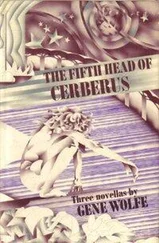“To yours. But murders are nothing unusual, are they? The eclectics are forever stabbing one another.”
“These men were burned to death, Lictor. I really don’t know much about it — no one seems to. Possibly you know more yourself.” The sergeant’s face was as expressionless as a carving of coarse, brown stone; but I saw him look quickly at the cold fireplace as he spoke, and I knew he attributed my breaking of the sticks (the sticks that had been so hard and dry in my hands but that I had not felt there until long after he entered, just as Abdiesus had not, perhaps, realized he was contemplating his own death until long after I had come to watch him) to something, some dark secret, the archon had imparted to me, when in fact it was nothing more than the memory of Dorcas and her despair, and of the beggar girl, whom I confused with her. He said, “I have two good fellows waiting outside, Lictor. They’re ready to go whenever you are, and they will wait for you until you’re ready to come back.” I told him that was very good, and he turned away at once so I would not guess he knew, or believed he knew, more than he had reported to me; but his stiff shoulders and corded neck, and the quick steps he took toward the door, conveyed more information than his stony eyes ever could.
My escorts were beefy men chosen for their strength. Flourishing their big, iron claves, they accompanied me as I shouldered Terminus Est down the winding streets, walking to either side when the way was wide enough, before and behind me when it was not. At the edge of the Acis I dismissed them, making them the more eager to leave me by telling them they had my permission to spend the remainder of the evening as they saw fit, and hired a narrow little caique (with a gaily painted canopy I had no need of now that the day’s last watch was over) to carry me upriver to the palace.
It was the first time I had actually ridden on the Acis. As I sat in the stern, between the steersman-owner and his four oarsmen, with the clear, icy river rushing by so near that I could have trailed both hands in it if I wished, it seemed impossible that this frail wooden shell, which from the embrasure of our bartizan must have appeared no more than a dancing insect, could hope to gain a span against the current. Then the steersman spoke and we were off — hugging the bank to be sure, but seeming almost to skip over the river like a thrown stone, so rapid and perfectly timed were the strokes of our eight oars and so light and narrow and smooth were we, traveling more in the air above the water than in the water itself. A pentagonal lantern set with panes of amethyst glass hung from the sternpost; just at the moment when I, in my ignorance, thought we were at the point of being caught amidships by the current, capsized, and swept sinking down to the Capulus, the steersman let the tiller hang by its lashings while he lit the wick.
He was right, of course, and I wrong. As the little door of the lantern shut upon the butter-yellow flame within and the violet beams leaped forth, an eddy caught us, spun us about, whirled us upstream a hundred strides or more while the rowers shipped their oars, and left us in a miniature bay as quiet as a millpond and half-filled with gaudy pleasure boats. Water stairs, very similar to the steps from which I had swum in Gyoll as a boy though much cleaner, marched out of the depths of the river and up to the brilliant torches and elaborate gates of the palace grounds.
I had often seen this palace from the Vincula, and thus I knew that it was not the subterranean structure modeled on the House Absolute that I might otherwise have expected. No more was it any such grim fortress as our Citadel — apparently the archon and his predecessors had considered the strong-points of Acies Castle and the Capulus, doubly linked as they were by the walls and forts strung along the crests of the cliffs, sufficient security for the safety of the city. Here the ramparts were mere box hedges intended to exclude the gaze of the curious and perhaps to give a check to casual thieves. Buildings with gilded domes were scattered over a pleasance that seemed intimate and colorful; from my embrasure they had looked much like peridots broken from their string and dropped upon a figured carpet.
There were sentries at the filigree gates, dismounted troopers in steel corselets and helmets, with blazing lances and long-bladed cavalry spathae; but they had the air of minor and amateur actors, good-natured, hard-bitten men enjoying a respite from running fights and wind-swept patrols. The pair to whom I showed my circle of painted paper no more than glanced at it before waving me inside.
I WAS ONE of the first guests to arrive. There were more bustling servants still than masquers, servants who seemed to have begun their work only a moment before, and to be determined to complete it at once. They lit candelabra with crystal lenses and coronas lucis suspended from the upper limbs of the trees, carried out trays of food and drink, positioned them, shifted them, then carried them back to one of the domed buildings again — the three acts being performed by three servants, but occasionally (no doubt because the others were busy elsewhere) by one.
For a time I wandered about the grounds, admiring the flowers by the fast fading twilight. Then, glimpsing people in costume between the pillars of a pavilion, I strolled inside to join them.
What such a gathering could be in the House Absolute, I have already described. Here, where the society was entirely provincial, it had, rather, the atmosphere of children playing dress-up in their parents’ old clothing; I saw men and women costumed as autochthons, with their faces stained russet and dabbed with white, and even one man who was an autochthon and yet was dressed like one, in a costume no more and no less authentic than the others, so that I was inclined to laugh at him until I realized that though he and I might be the only ones who knew it, he was in fact costumed more originally than any of the rest, as a citizen of Thrax in costume. Around all these autochthons, real and self-imagined, were a score of other figures not less absurd — officers dressed as women and women dressed as soldiers, eclectics as fraudulent as the autochthons, gymnosophists, ablegates and their acolytes, eremites, eidolons, zoanthrops half beast and half human, and deodands and remontados in picturesque rags, with eyes painted wild.
I found myself thinking how strange it would be if the New Sun, the Daystar himself, were to appear now as suddenly as he had appeared so long ago when he was called the Conciliator, appearing here because it was an inappropriate place and he had always preferred the least appropriate places, seeing these people through fresher eyes than we ever could; and if he, thus appearing here, were to decree by theurgy that all of them (none of whom I knew and none of whom knew me) should forever after live the roles they had taken up tonight, the autochthons hunching over smoky fires in mountain huts of stone, the real autochthon forever a townsman at a ridotto, the women spurring toward the enemies of the Commonwealth with sword in hand, the officers doing needlepoint at north windows and looking up to sigh over empty roads, the deodands mourning their unspeakable abominations in the wilderness, the remontados burning their own homes and setting their eyes upon the mountains; and only I unchanged, as it is said the velocity of light is unchanged by mathematical transformations.
Then, while I was grinning to myself behind my mask, it seemed that the Claw, in its soft leathern sack, drove against my breastbone to remind me that the Conciliator had been no jest, and that I bore some fragment of his power with me. At that moment, as I looked across the room over all the feathered and helmeted and wild-haired heads, I saw a Pelerine.
Читать дальше










